Resume
Optometrist Cover Letter Examples

May 29, 2025
|
12 min read
Craft a winning optometrist cover letter that catches the right eye. Learn how to focus on your strengths and clearly outline your experience, ensuring your vision for the role aligns with the employer's needs.
4.70 Average rating
Rated by 348 people
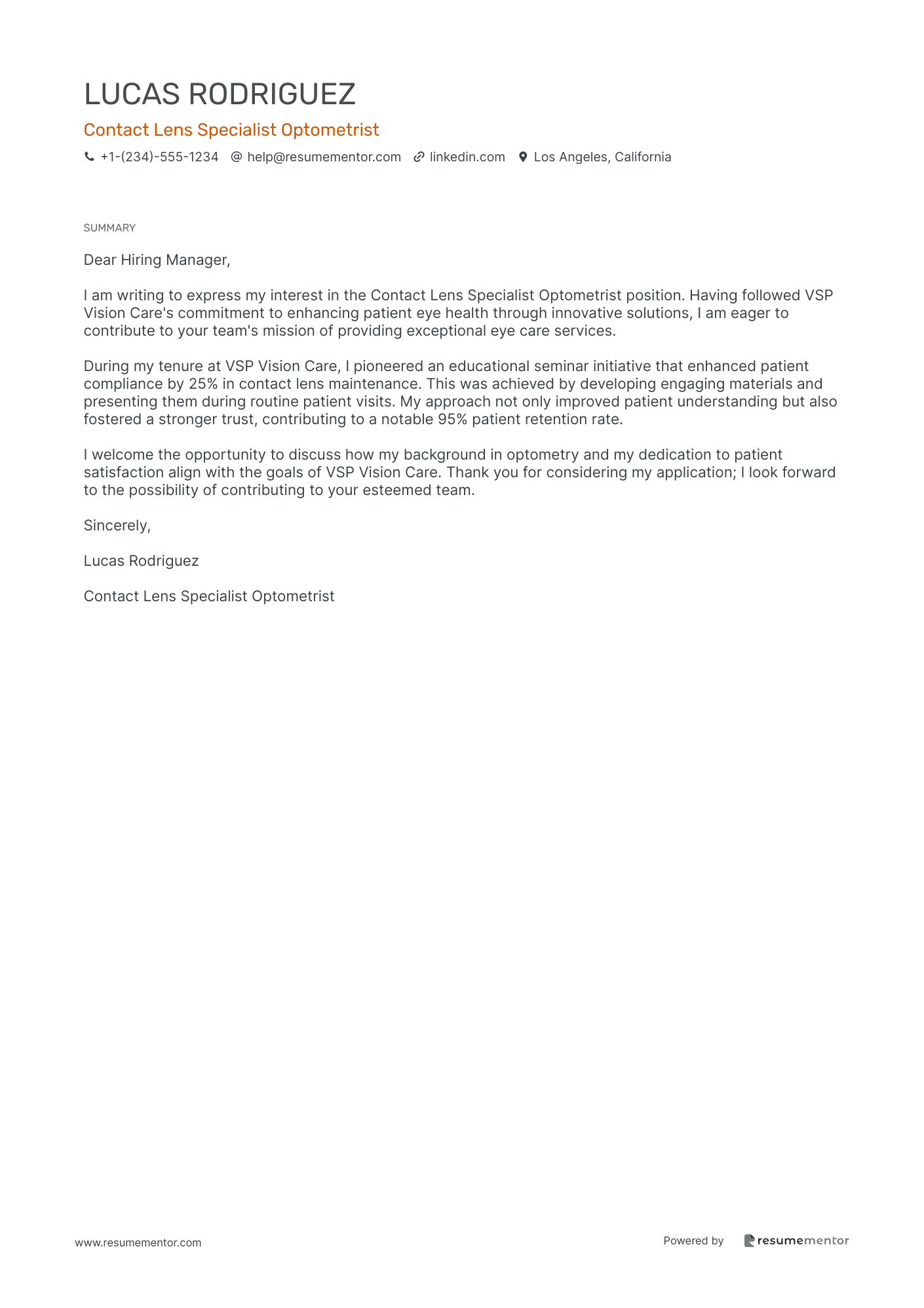
Contact Lens Specialist Optometrist
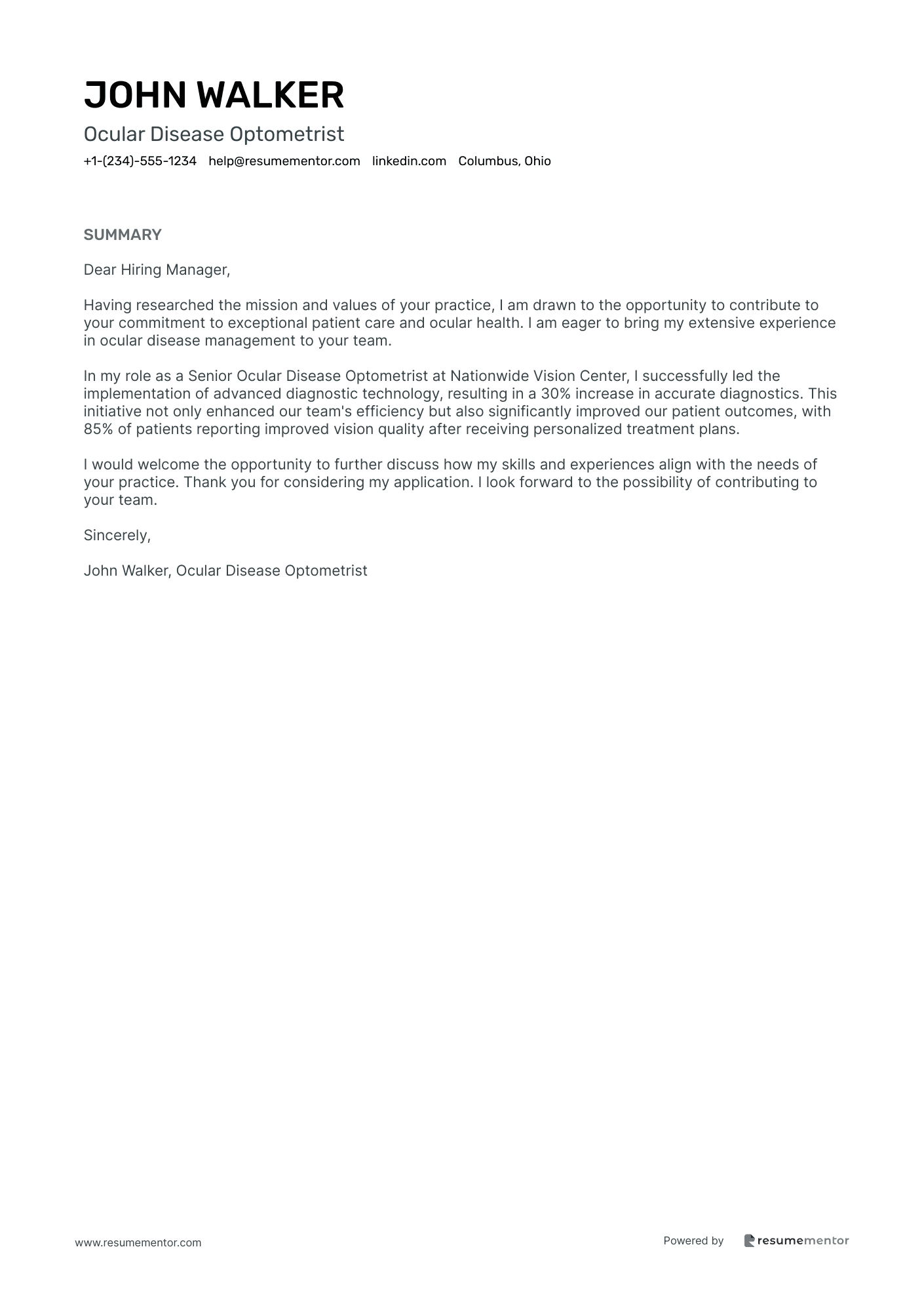
Ocular Disease Optometrist
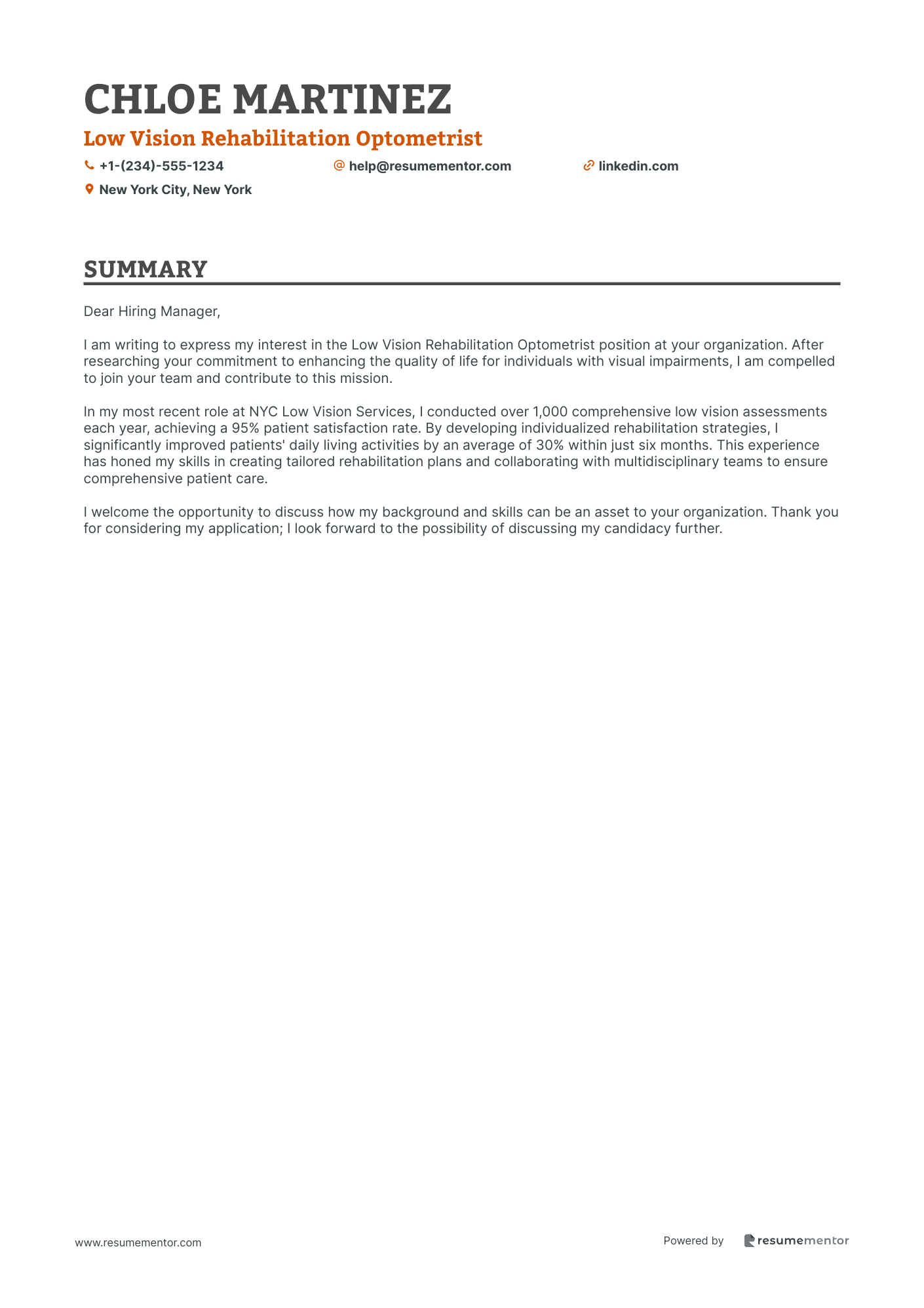
Low Vision Rehabilitation Optometrist
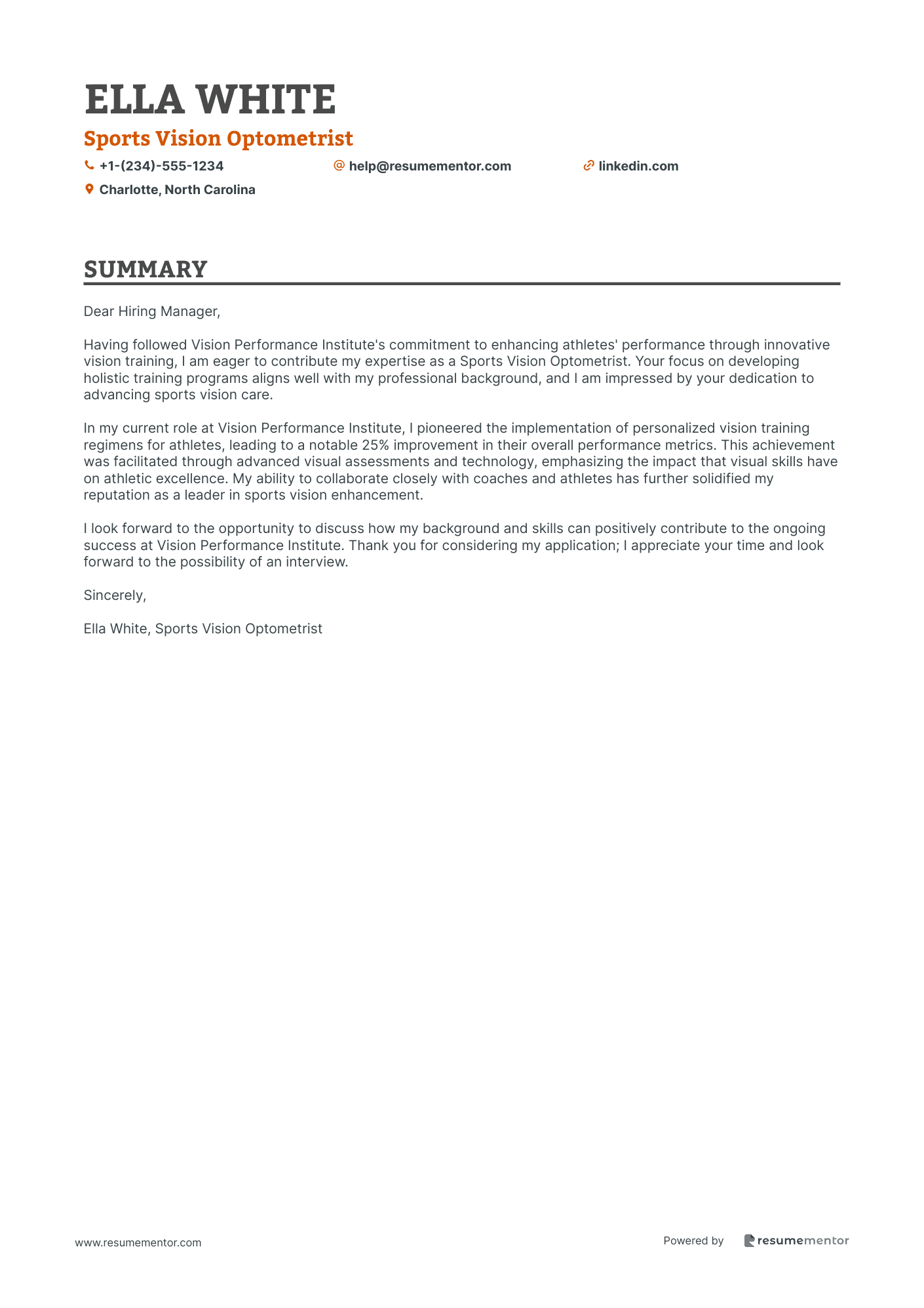
Sports Vision Optometrist
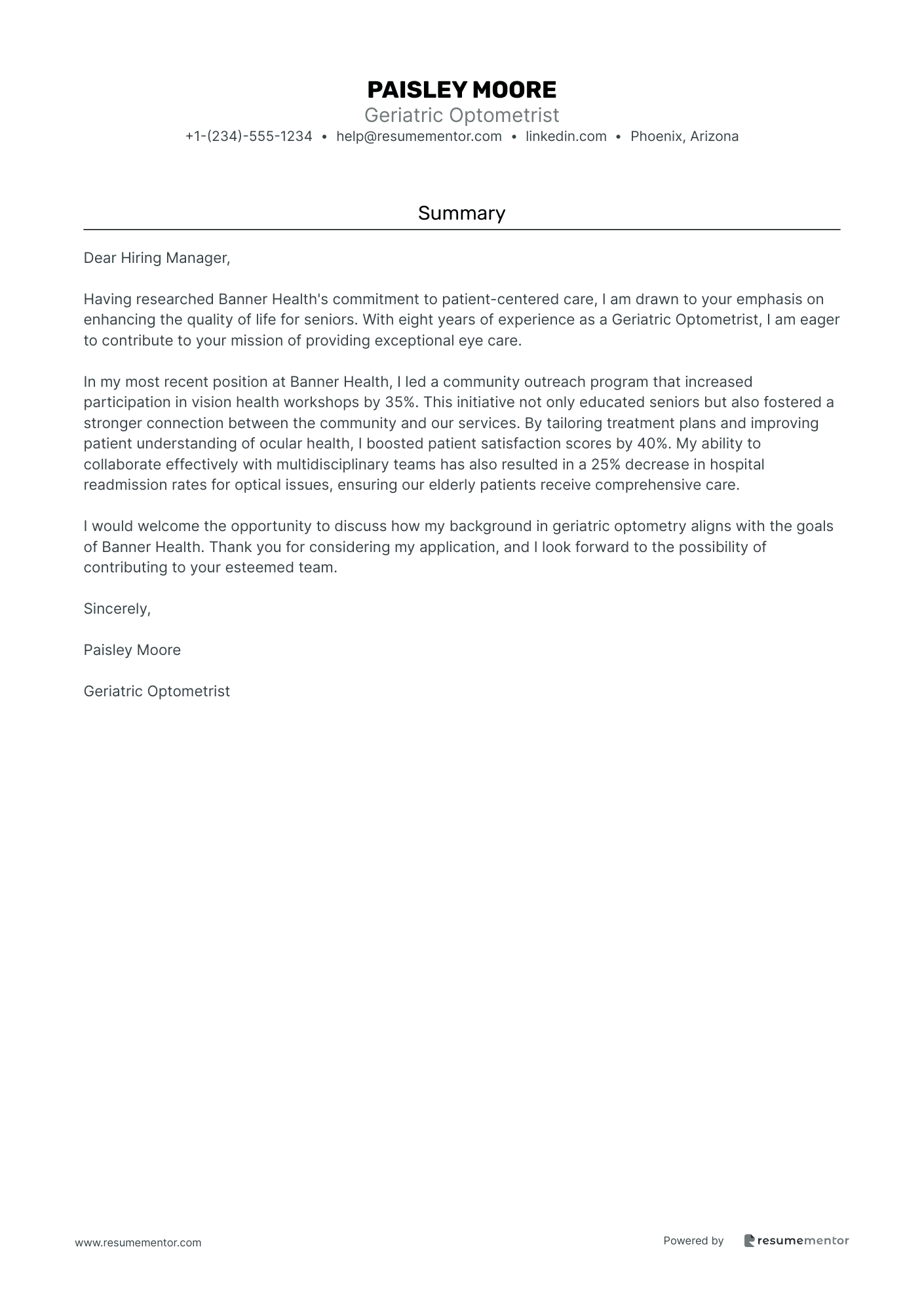
Geriatric Optometrist
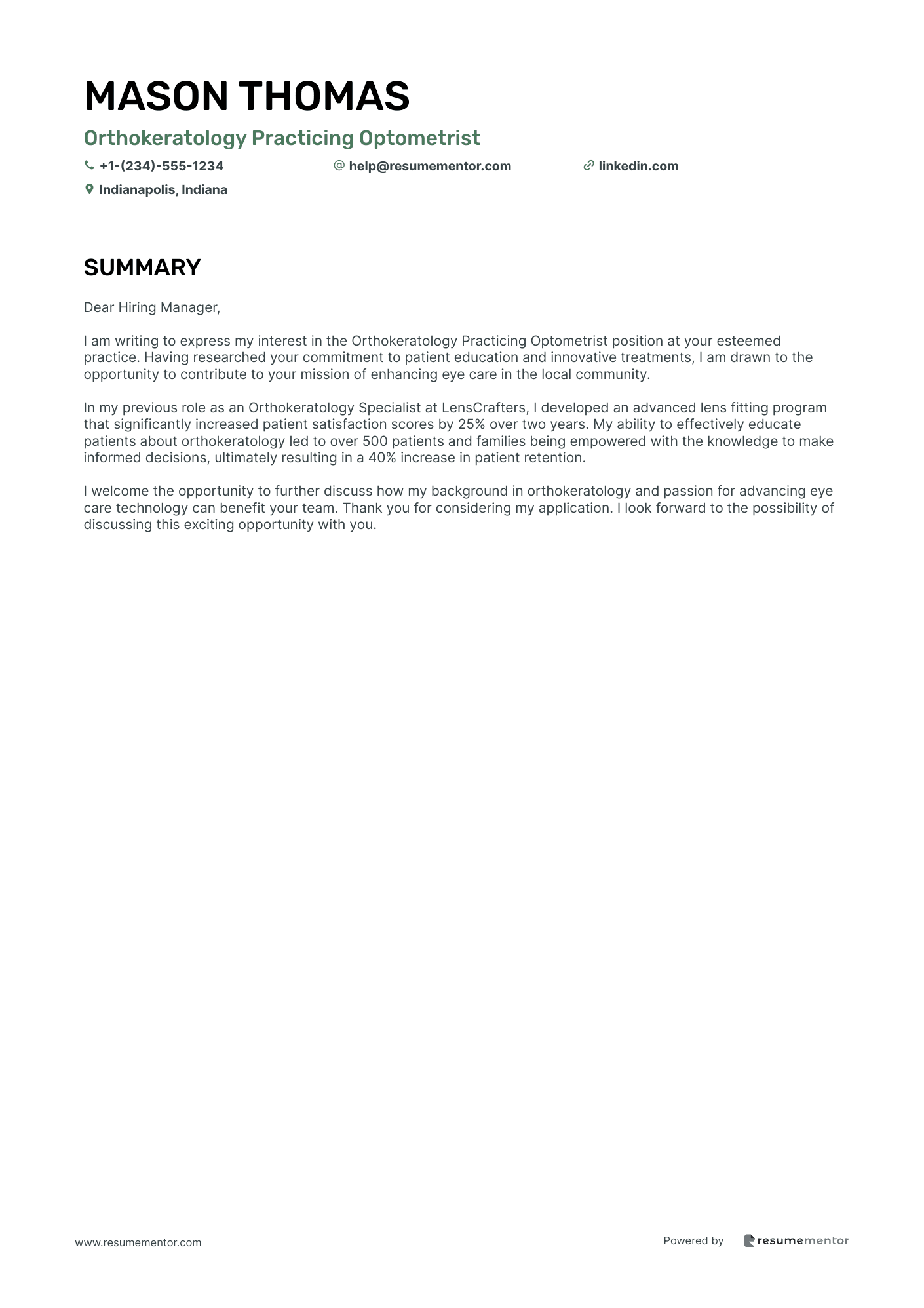
Orthokeratology Practicing Optometrist
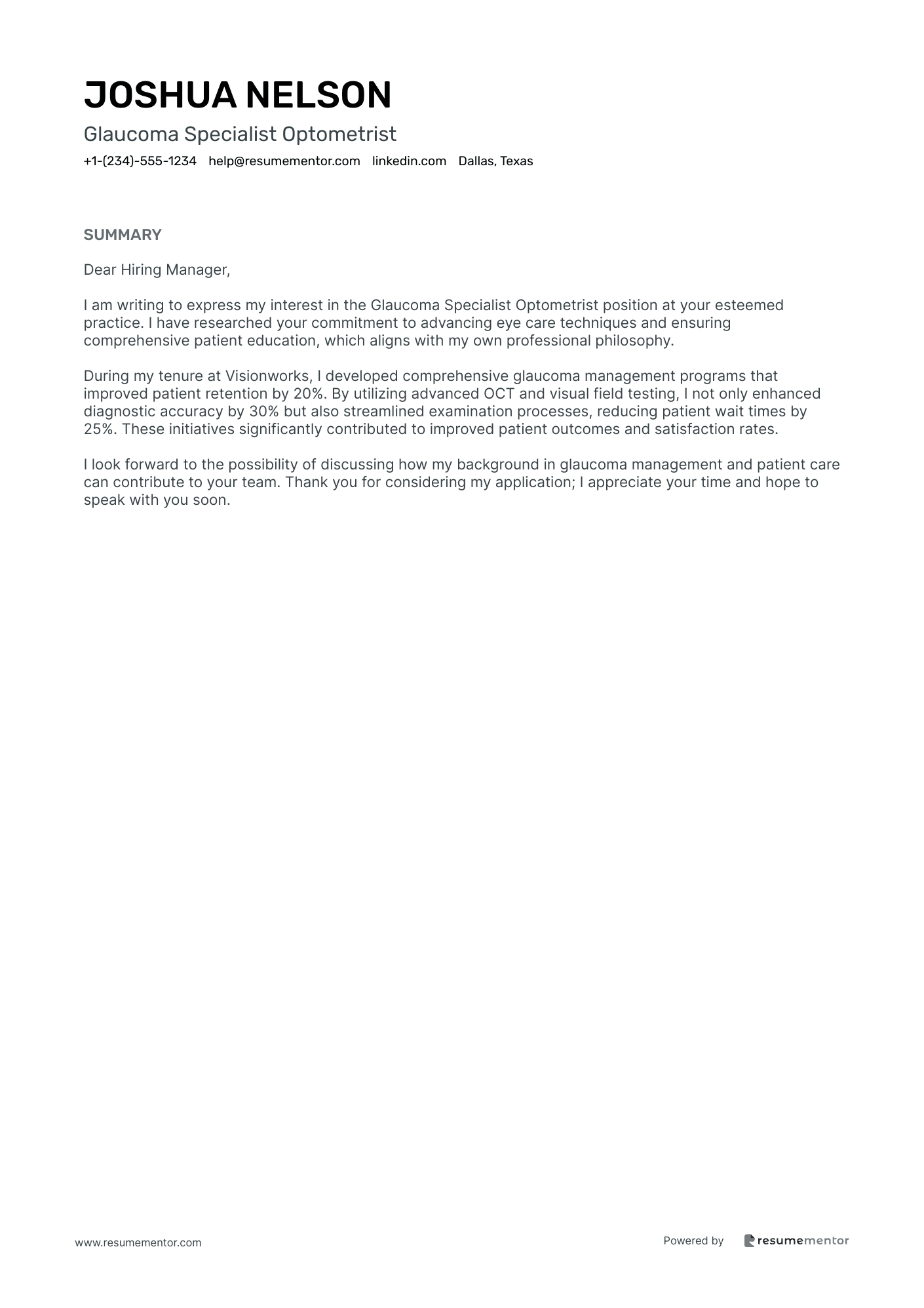
Glaucoma Specialist Optometrist
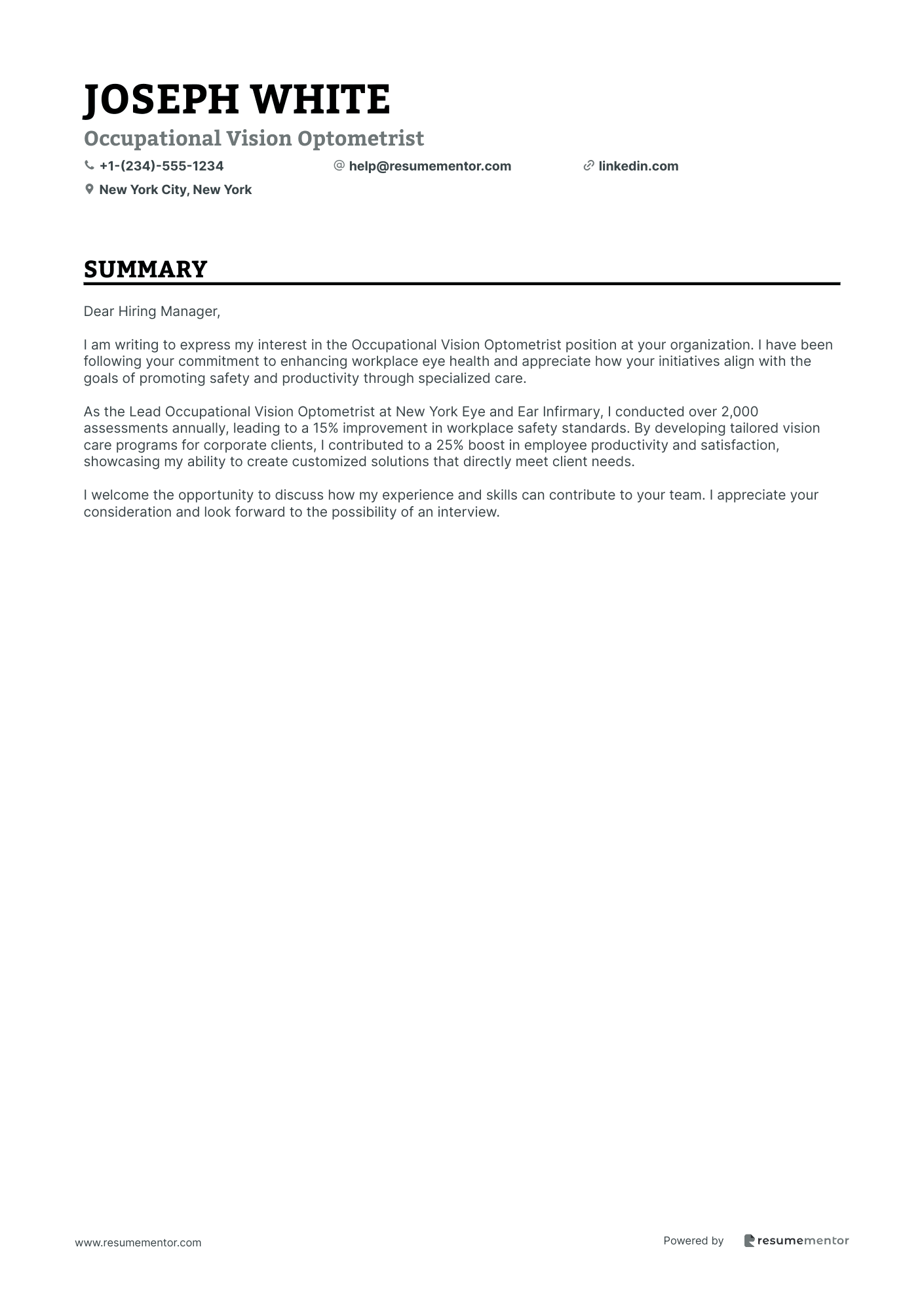
Occupational Vision Optometrist
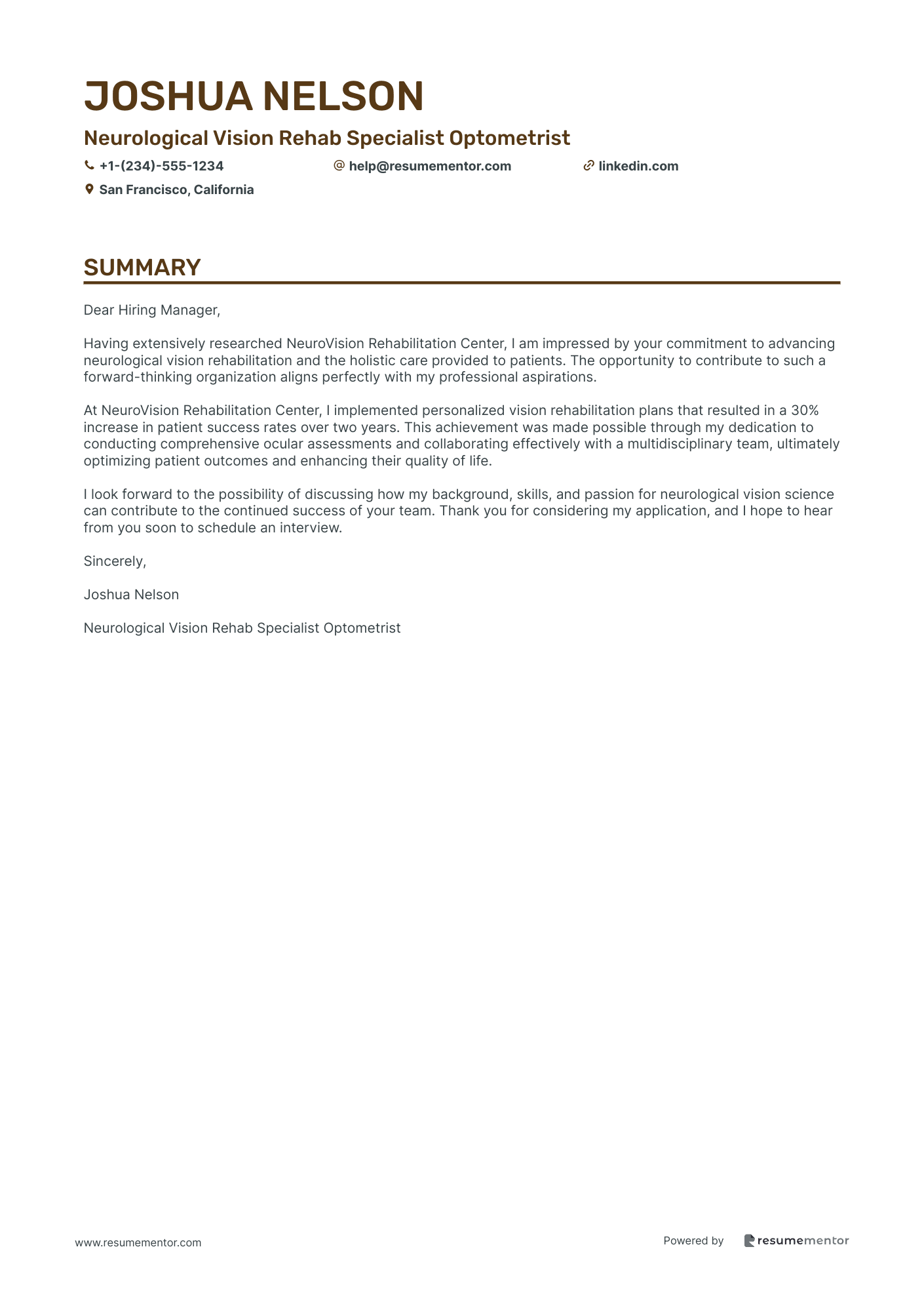
Neurological Vision Rehab Specialist Optometrist
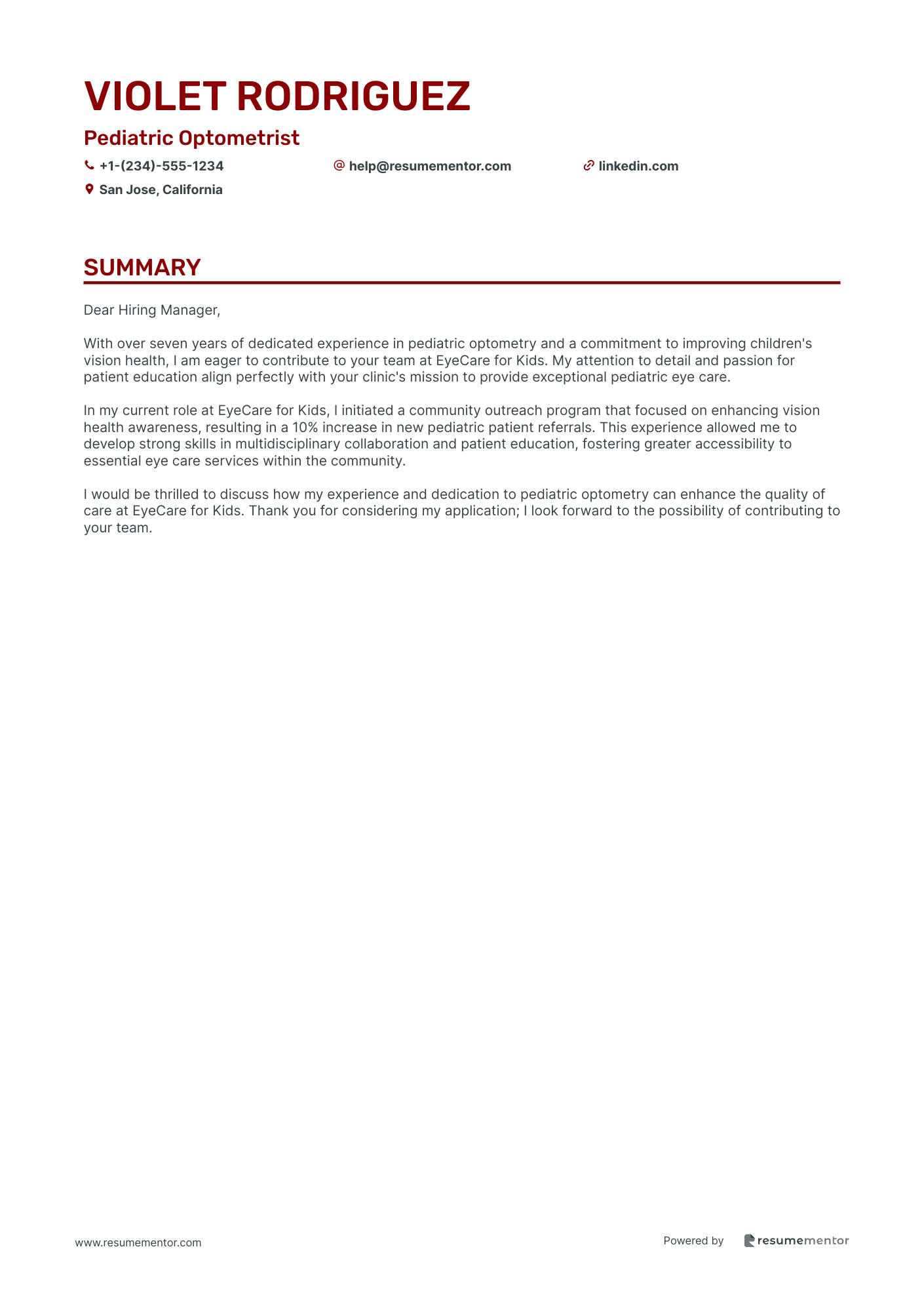
Pediatric Optometrist

Contact Lens Specialist Optometrist cover letter sample
When applying for this role, it's important to showcase any experience in fitting contact lenses and providing eye care. Highlight your knowledge of different lens types, including soft, rigid, and specialty options. Emphasize strong interpersonal skills, as patient education is key in this field. If you've completed coursework in ocular health or attended relevant workshops, be sure to mention these details. Include specific outcomes, such as improved patient satisfaction or increased lens sales, to demonstrate how your expertise positively impacted past positions.
Lucas Rodriguez
Contact Lens Specialist Optometrist
Summary
Dear Hiring Manager,
I am writing to express my interest in the Contact Lens Specialist Optometrist position. Having followed VSP Vision Care's commitment to enhancing patient eye health through innovative solutions, I am eager to contribute to your team's mission of providing exceptional eye care services.
During my tenure at VSP Vision Care, I pioneered an educational seminar initiative that enhanced patient compliance by 25% in contact lens maintenance. This was achieved by developing engaging materials and presenting them during routine patient visits. My approach not only improved patient understanding but also fostered a stronger trust, contributing to a notable 95% patient retention rate.
I welcome the opportunity to discuss how my background in optometry and my dedication to patient satisfaction align with the goals of VSP Vision Care. Thank you for considering my application; I look forward to the possibility of contributing to your esteemed team.
Sincerely,
Lucas Rodriguez
Contact Lens Specialist Optometrist
Ocular Disease Optometrist cover letter sample
When applying for this position, highlight any clinical experience in ocular disease management. Include specific cases where your intervention led to improved patient outcomes. Certifications in ocular disease treatments or advanced diagnostic technologies should be emphasized, along with the duration of each training. Mention your ability to work collaboratively with healthcare teams and how your skills in patient education have resulted in better treatment adherence. Use concrete examples demonstrating your analytical skills in diagnosing complex conditions to showcase your depth of understanding and commitment to patient care.
John Walker
Ocular Disease Optometrist
Summary
Dear Hiring Manager,
Having researched the mission and values of your practice, I am drawn to the opportunity to contribute to your commitment to exceptional patient care and ocular health. I am eager to bring my extensive experience in ocular disease management to your team.
In my role as a Senior Ocular Disease Optometrist at Nationwide Vision Center, I successfully led the implementation of advanced diagnostic technology, resulting in a 30% increase in accurate diagnostics. This initiative not only enhanced our team's efficiency but also significantly improved our patient outcomes, with 85% of patients reporting improved vision quality after receiving personalized treatment plans.
I would welcome the opportunity to further discuss how my skills and experiences align with the needs of your practice. Thank you for considering my application. I look forward to the possibility of contributing to your team.
Sincerely,
John Walker, Ocular Disease Optometrist
Low Vision Rehabilitation Optometrist cover letter sample
When applying for this position, it's essential to showcase your clinical experience with patients who have visual impairments. Highlight any specialized training or certification in low vision assessment tools, such as magnifiers or electronic aids. Discuss your proficiency in creating tailored rehabilitation plans that enhance patients’ daily activities and quality of life. Use concrete examples to illustrate how your interventions have led to improved independence for your patients. Include metrics where possible, like patient satisfaction ratings or successful outcomes, to demonstrate your impact effectively.
Chloe Martinez
Low Vision Rehabilitation Optometrist
Summary
Dear Hiring Manager,
I am writing to express my interest in the Low Vision Rehabilitation Optometrist position at your organization. After researching your commitment to enhancing the quality of life for individuals with visual impairments, I am compelled to join your team and contribute to this mission.
In my most recent role at NYC Low Vision Services, I conducted over 1,000 comprehensive low vision assessments each year, achieving a 95% patient satisfaction rate. By developing individualized rehabilitation strategies, I significantly improved patients' daily living activities by an average of 30% within just six months. This experience has honed my skills in creating tailored rehabilitation plans and collaborating with multidisciplinary teams to ensure comprehensive patient care.
I welcome the opportunity to discuss how my background and skills can be an asset to your organization. Thank you for considering my application; I look forward to the possibility of discussing my candidacy further.
Sports Vision Optometrist cover letter sample
Emphasize any specialized training in vision therapy or sports vision assessments. Highlight experience with vision performance training and how it has improved athletes' game. Discuss your skills in using advanced diagnostic technology and understanding visual principles in sports. If you’ve participated in relevant workshops or earned certifications, mention these to demonstrate your commitment. Use examples of how your interventions enhanced athletes’ visual acuity, reaction time, or overall performance, illustrating your impact on their success with a clear ‘skill-action-result’ framework.
Ella White
Sports Vision Optometrist
Summary
Dear Hiring Manager,
Having followed Vision Performance Institute's commitment to enhancing athletes' performance through innovative vision training, I am eager to contribute my expertise as a Sports Vision Optometrist. Your focus on developing holistic training programs aligns well with my professional background, and I am impressed by your dedication to advancing sports vision care.
In my current role at Vision Performance Institute, I pioneered the implementation of personalized vision training regimens for athletes, leading to a notable 25% improvement in their overall performance metrics. This achievement was facilitated through advanced visual assessments and technology, emphasizing the impact that visual skills have on athletic excellence. My ability to collaborate closely with coaches and athletes has further solidified my reputation as a leader in sports vision enhancement.
I look forward to the opportunity to discuss how my background and skills can positively contribute to the ongoing success at Vision Performance Institute. Thank you for considering my application; I appreciate your time and look forward to the possibility of an interview.
Sincerely,
Ella White, Sports Vision Optometrist
Geriatric Optometrist cover letter sample
When preparing your cover letter for this role, it’s essential to emphasize any previous experience working with older adults. Highlight your understanding of age-related visual changes and specific conditions such as glaucoma or macular degeneration. If you have completed relevant training or workshops, mention these to demonstrate your commitment to ongoing education. Also, provide examples of how your patient care skills have improved outcomes for elderly patients, focusing on a 'skill-action-result' structure to showcase your impact effectively.
Paisley Moore
Geriatric Optometrist
Summary
Dear Hiring Manager,
Having researched Banner Health's commitment to patient-centered care, I am drawn to your emphasis on enhancing the quality of life for seniors. With eight years of experience as a Geriatric Optometrist, I am eager to contribute to your mission of providing exceptional eye care.
In my most recent position at Banner Health, I led a community outreach program that increased participation in vision health workshops by 35%. This initiative not only educated seniors but also fostered a stronger connection between the community and our services. By tailoring treatment plans and improving patient understanding of ocular health, I boosted patient satisfaction scores by 40%. My ability to collaborate effectively with multidisciplinary teams has also resulted in a 25% decrease in hospital readmission rates for optical issues, ensuring our elderly patients receive comprehensive care.
I would welcome the opportunity to discuss how my background in geriatric optometry aligns with the goals of Banner Health. Thank you for considering my application, and I look forward to the possibility of contributing to your esteemed team.
Sincerely,
Paisley Moore
Geriatric Optometrist
Orthokeratology Practicing Optometrist cover letter sample
When crafting your cover letter, emphasize any previous experience with contact lenses and managing patients with refractive errors. Highlight skills in assessing and fitting orthokeratology lenses effectively. Mention any specialized training or certifications related to corneal reshaping and vision correction. Use specific examples to illustrate how your interventions improved patients' vision or quality of life. Focus on your patient communication skills and how they foster trust and satisfaction. Demonstrating measurable outcomes from past experiences will enhance your application and show your proficiency in this field.
Mason Thomas
Orthokeratology Practicing Optometrist
Summary
Dear Hiring Manager,
I am writing to express my interest in the Orthokeratology Practicing Optometrist position at your esteemed practice. Having researched your commitment to patient education and innovative treatments, I am drawn to the opportunity to contribute to your mission of enhancing eye care in the local community.
In my previous role as an Orthokeratology Specialist at LensCrafters, I developed an advanced lens fitting program that significantly increased patient satisfaction scores by 25% over two years. My ability to effectively educate patients about orthokeratology led to over 500 patients and families being empowered with the knowledge to make informed decisions, ultimately resulting in a 40% increase in patient retention.
I welcome the opportunity to further discuss how my background in orthokeratology and passion for advancing eye care technology can benefit your team. Thank you for considering my application. I look forward to the possibility of discussing this exciting opportunity with you.
Glaucoma Specialist Optometrist cover letter sample
When applying for this position, highlight your specific training in diagnosing and managing glaucoma. Mention any fellowships or specialized courses that showcase your expertise. Emphasize your experience using advanced diagnostic tools and technologies. Include statistics or examples of how your interventions led to improved patient outcomes. Strong collaboration with ophthalmologists and ongoing patient education are vital aspects, so demonstrate your commitment to interdisciplinary care. Use a 'skill-action-result' format to illustrate how your efforts have positively impacted patient health and satisfaction in previous roles.
Joshua Nelson
Glaucoma Specialist Optometrist
Summary
Dear Hiring Manager,
I am writing to express my interest in the Glaucoma Specialist Optometrist position at your esteemed practice. I have researched your commitment to advancing eye care techniques and ensuring comprehensive patient education, which aligns with my own professional philosophy.
During my tenure at Visionworks, I developed comprehensive glaucoma management programs that improved patient retention by 20%. By utilizing advanced OCT and visual field testing, I not only enhanced diagnostic accuracy by 30% but also streamlined examination processes, reducing patient wait times by 25%. These initiatives significantly contributed to improved patient outcomes and satisfaction rates.
I look forward to the possibility of discussing how my background in glaucoma management and patient care can contribute to your team. Thank you for considering my application; I appreciate your time and hope to speak with you soon.
Occupational Vision Optometrist cover letter sample
When applying, emphasize any experience in vision therapy or rehabilitative care. Highlight your understanding of visual processing disorders and your ability to create personalized treatment plans. Certifications in specialties, like low vision or pediatric care, should be mentioned to show expertise. Include specific examples of how you've improved patient outcomes or enhanced their quality of life. Use the 'skill-action-result' format to clearly demonstrate the impact of your interventions, making your application stand out in terms of relevance and results-driven focus.
Joseph White
Occupational Vision Optometrist
Summary
Dear Hiring Manager,
I am writing to express my interest in the Occupational Vision Optometrist position at your organization. I have been following your commitment to enhancing workplace eye health and appreciate how your initiatives align with the goals of promoting safety and productivity through specialized care.
As the Lead Occupational Vision Optometrist at New York Eye and Ear Infirmary, I conducted over 2,000 assessments annually, leading to a 15% improvement in workplace safety standards. By developing tailored vision care programs for corporate clients, I contributed to a 25% boost in employee productivity and satisfaction, showcasing my ability to create customized solutions that directly meet client needs.
I welcome the opportunity to discuss how my experience and skills can contribute to your team. I appreciate your consideration and look forward to the possibility of an interview.
Neurological Vision Rehab Specialist Optometrist cover letter sample
When applying for this position, it’s important to highlight any experience you have in vision therapy or rehabilitation. Mention any certifications related to vision science or neuro-optometry that you have earned. Strong interpersonal skills are essential, as you will work closely with patients. Include specific examples of how you have assessed patient needs and developed customized treatment plans, using a clear 'skill-action-result' format to demonstrate your effectiveness. Discuss any collaborative efforts with multidisciplinary teams that improved patient outcomes.
Joshua Nelson
Neurological Vision Rehab Specialist Optometrist
Summary
Dear Hiring Manager,
Having extensively researched NeuroVision Rehabilitation Center, I am impressed by your commitment to advancing neurological vision rehabilitation and the holistic care provided to patients. The opportunity to contribute to such a forward-thinking organization aligns perfectly with my professional aspirations.
At NeuroVision Rehabilitation Center, I implemented personalized vision rehabilitation plans that resulted in a 30% increase in patient success rates over two years. This achievement was made possible through my dedication to conducting comprehensive ocular assessments and collaborating effectively with a multidisciplinary team, ultimately optimizing patient outcomes and enhancing their quality of life.
I look forward to the possibility of discussing how my background, skills, and passion for neurological vision science can contribute to the continued success of your team. Thank you for considering my application, and I hope to hear from you soon to schedule an interview.
Sincerely,
Joshua Nelson
Neurological Vision Rehab Specialist Optometrist
Pediatric Optometrist cover letter sample
When applying for this position, it's essential to highlight any experience working with children. Mention any internships or roles that involved pediatric care or vision assessments. Emphasize your ability to communicate complex information in an understandable way for children and their parents. Relevant certifications, like pediatric vision training, should be included. Provide examples of successful outcomes, such as improved vision screening results or positive feedback from parents. Demonstrating a patient-centered approach will show your commitment to creating a supportive environment for young patients.
Violet Rodriguez
Pediatric Optometrist
Summary
Dear Hiring Manager,
With over seven years of dedicated experience in pediatric optometry and a commitment to improving children's vision health, I am eager to contribute to your team at EyeCare for Kids. My attention to detail and passion for patient education align perfectly with your clinic's mission to provide exceptional pediatric eye care.
In my current role at EyeCare for Kids, I initiated a community outreach program that focused on enhancing vision health awareness, resulting in a 10% increase in new pediatric patient referrals. This experience allowed me to develop strong skills in multidisciplinary collaboration and patient education, fostering greater accessibility to essential eye care services within the community.
I would be thrilled to discuss how my experience and dedication to pediatric optometry can enhance the quality of care at EyeCare for Kids. Thank you for considering my application; I look forward to the possibility of contributing to your team.
Related Articles

Continue Reading
Check more recommended readings to get the job of your dreams.
Resume
Resources
Tools
© 2026. All rights reserved.
Made with love by people who care.
